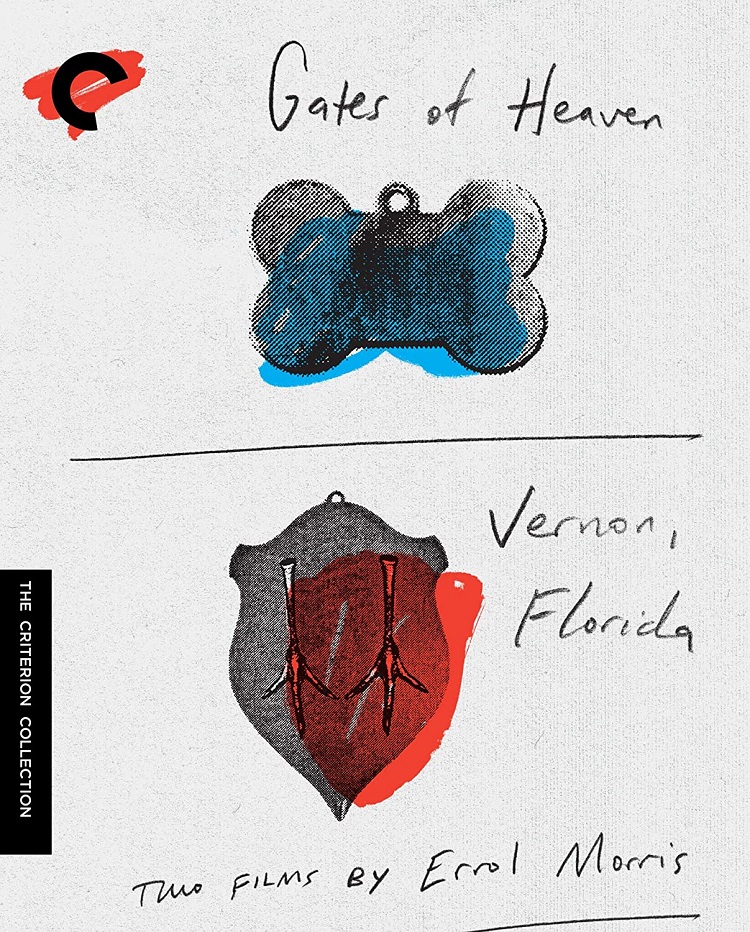
“I love the absurd,” says Errol Morris in one of the extras on the new Criterion Collection Blu-ray edition of Gates of Heaven (1978) / Vernon, Florida (1981). These are the first two films from the director of such notable documentaries as The Thin Blue Line (1988), A Brief History of Time (1991), and the Academy Award-winning The Fog of War: Eleven Lesson from the Life of Robert S. McNamara (2003), among others. To call the people he interviews in both of these pictures “absurd” is probably an understatement, but it will do. The characters Morris speaks to are true outsiders and living embodiments of the old maxim that truth is stranger than fiction.
Gates of Heaven is ostensibly about the closing of a pet cemetery in Northern California. This may not seem to be the most riveting subject for a filmmaker to tackle, but Gates of Heaven tells a story that is rich in irony, philosophical concerns, and spirituality. Or it may that the director is mocking these people and quietly smirking behind the camera. He never shows his hand, a tactic which just adds another layer of brilliance to the whole affair.
As a director, Morris stumbled out of the gate. His first project was to be a documentary about the serial killer Ed Gein, but it fell through. He then heard about a town in which an inordinate number of people had suffered amputations, allegedly as an insurance scam. The town was so notorious that the insurance industry had nicknamed it “Nub City.” When Morris began receiving anonymous death threats about his Nub City investigations, he abandoned that project as well.
The third time was the charm. When Morris returned home to the Bay Area, he heard that a pet cemetery was closing, and decided to document this situation. What he emerged with was Gates of Heaven, a film that Roger Ebert claimed to have seen thirty times, and still had not gotten anywhere near the bottom of.
Floyd “Mac” McLure is the owner of the pet cemetery that is closing, and he is man with deeply held beliefs on what pets mean and why they should be buried with respect. These sentiments are offset with those of a man who owns a nearby rendering plant, and talks about grinding up and using every last bit of an animal. The San Francisco Chronicle headline that drew Morris in to the situation read “450 Dead Pets Going to Napa Valley,” and that is where the second part of the film takes place. The Bubbling Well Pet Memorial Park is run by John “Cal” Harberts and his two sons. Their collective takes on the world in general make up the second half of the movie.
There are no confrontations, no egregious acts, or any action to speak of at all during Gates of Heaven, yet it is one of the most fascinating pictures I have ever seen. The people that Morris interviews are so completely off their rockers, yet so heartwarming that one cannot help being taken in. Gates of Heaven is a film that I have watched three times (so far), and I share Ebert’s opinion. The things that these folks say are priceless. From the little old lady who goes on a long tangent about her son owing her $400, to the Harbert boy who is still “finding himself,” to the cynical rendering-plant owner, it is all incredibly alluring. These people are unforgettable.
Morris mines similar territory in Vernon, Florida. Vernon is Nub City, although no mention of this is made in the film. The death threats convinced Morris not to pursue the amputee phenomenon, but the entire town of Vernon seems to be insane, amputee or not. The bulk of Vernon, Florida is taken up with interviews with a cop, a turkey hunter, a preacher, and an old codger who could be described as a wild animal zoo-keeper I suppose. All of these people are a bit out there, although again, Morris does not mock them. He simply lets them tell their stories.
Gates of Heaven is presented in an aspect ratio of 1.33:1, and Vernon, Florida is presented in an aspect ratio of 1.66:1. The soundtrack for both is uncompressed monaural. Although the notes mention the removal of “thousands of instances of dirt and debris,” the color appears washed out in many portions of Vernon, Florida especially. It is unlikely that either of these movies will ever be confused with a 3-D extravaganza though, and the picture quality is certainly acceptable.
There are four extras. Werner Herzog Eats His Shoe (1980) is a short film by Les Blank. Herzog vowed to literally eat his shoe if his friend Morris ever finished a film, and he makes good on his promise at the premiere of Gates of Heaven (20:17).”Herzog at Telluride” (1:05) captures comments Herzog made at the 1980 Telluride Film Festival about Gates of Heaven. While Herzog’s support was crucial at the time, Morris’ own comments about the films provide some interesting contemporary perspectives.
In 2014, Morris was interviewed by The Criterion Collection about Gates of Heaven (19:19) and Vernon, Florida (12:08). Both of these segments provide insight into his process, and he also mentions that his initial intentions may have been mocking, but that these people won him over. There is also a booklet included in the package, which features an essay about Morris and his films by critic Eric Hynes.
Morris wisely moved on after Vernon, Florida, because he was already falling into the trap of finding weirdos to interview. And that is kind of what Vernon, Florida feels like. As part of the Gates of Heaven package though, I am very happy that Criterion included it. The best parts of both of these films remind me of The Duplex Planet fanzine. That cult classic contained bits of wisdom from nursing-home residents, presented without commentary. Gates of Heaven and Vernon, Florida were the origins, and Gates of Heaven in particular remains spellbinding.